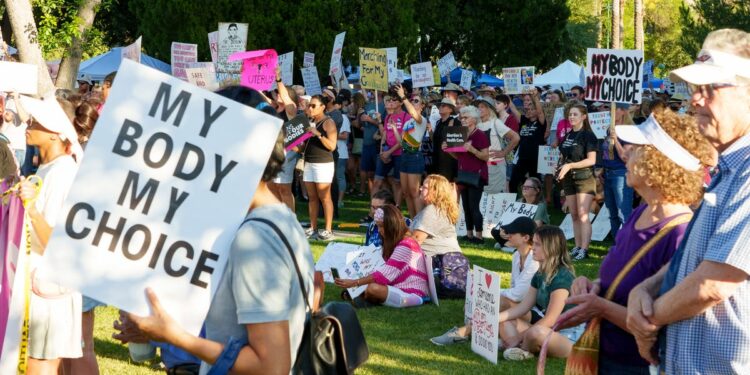Proposition 139 passes in 2024 Arizona election
An Arizona crowd celebrates after the passing of Proposition 139, which will enshrine abortion rights in the state constitution, on Nov. 5, 2024.
Enforcement of Arizona’s 15-week abortion ban is expected to go away within weeks, but providers say it’s not the endgame for reproductive freedom. Obstacles are still ahead, including staving off restrictions on birth control, they say.
Proposition 139, which Arizona voters passed on Nov. 5, is an amendment that enshrines the right to an abortion in the state constitution and will end the state’s current 15-week ban, which took effect in 2022 and makes no exceptions for rape and incest. The ban has yielded reports of some women with heartbreaking pregnancy complications getting refused care by Arizona hospitals.
Passage of the amendment, known as the Arizona Abortion Access Act, was a message from voters that abortion access needs protection, said Dr. Katherine Glaser, an OB-GYN, who serves as a rural director on the board of the Arizona Medical Association. As long as there’s no federal interference with abortion laws, “we can know that women and families in Arizona are at least protected and able to access full reproductive health,” Glaser said.
Knowing that abortion care is returning to the hands of doctors and patients is a thrilling and significant moment for Arizona, said Dr. Gabrielle Goodrick, a family physician and owner of Camelback Family Planning in Phoenix, which provides abortions.
“This is a major step. This will be in our constitution, so whatever governor, legislature is in power, it’s not going to be back and forth, it’s not going to be an issue here, hopefully,” she said.
Yet potential attacks on reproductive rights in Arizona remain. Among them is concern about a federal abortion ban. During his election campaign, President-elect Donald J. Trump said he wants to leave abortion regulation up to individual states, suggesting he may not sign such a ban into law, but his critics maintain a second Trump administration poses dangers for abortion access.
Trump’s vice presidential pick, JD Vance has said he would de-fund Planned Parenthood of America, a move that could severely hurt the ability of Arizonans, particularly people living in rural areas, to access not just abortion care, but contraception, too. Planned Parenthood Arizona operates seven clinics, including four that provide abortions. The clinics offer wellness visits, birth control, pregnancy testing and HIV services, among other things.
Planned Parenthood is taking such threats seriously and is “preparing for a long fight to protect access to care throughout the country,” said Olivia Cappello, a spokesperson for the national Planned Parenthood Action Fund. There’s no plan for where Planned Parenthood’s patients would go if its clinics were to close, Cappello said.
“There’s no possible way that our existing health care system can absorb the patient load if there are cuts to funding that goes to Planned Parenthood health centers and other reproductive health care providers,” Cappello said. “For a lot of people, their local Planned Parenthood health center is their first point of contact for health care.”
Here are five things to know about what’s next for reproductive care in Arizona now that Proposition 139 has passed:
Abortions after 15 weeks could be legal as of Nov. 25
Arizona abortion providers are expected to be able to legally provide abortions after 15 weeks as of Nov. 25, a spokesperson for Arizona Attorney General Kris Mayes confirmed.
“Prop. 139 should take effect on November 25th, when the statewide canvass is certified. Like any other constitutional provision, it will supersede any statutory provisions,” spokesperson Richie Taylor wrote in a statement, adding that litigation may be needed for the courts to determine how existing state abortion laws are impacted by the amendment.
Andy Gaona, an attorney for the Proposition 139 campaign, said the measure could trigger lawsuits challenging some of Arizona’s more than 40 abortion laws, including the existing 15-week law, meaning there could be some period of legal debate before abortion is fully protected.Â
Abortion providers say they aren’t counting on any specific date for the 15-week ban to go away and say it could be later than Nov. 25.
“Right now as Planned Parenthood Arizona what we’re telling patients is that our doors are still open and at the moment we’re continuing to provide abortion care under the 15-week ban,” said Erika Mach, Chief External Affairs Officer, Planned Parenthood Advocates of Arizona. “In this moment now, that’s where we’re at.”
The amendment, once it takes effect, will prohibit any restriction on an abortion until fetal viability, which is around 23 weeks or 24 weeks of pregnancy. It also says the government can’t stop an abortion after viability if it’s necessary to protect the life or physical or mental health of the mother.
Ending the 15-week ban will help pregnant people with unexpected complications
Goodrick said only about 5% of her patients need abortions after 15 weeks, but for those patients, expanding the law is critically important to their health and wellbeing.
In four cases that became public during the past year, Arizona women pregnant with babies they were looking forward to having experienced tragic complications after 15 weeks and struggled to find help.
“It’s just gotten to a point where it’s so political and people are so scared that they will not help these patients,” Goodrick said. “It’s a problem with training, hospitals’ fear. If there’s a heartbeat it’s an abortion and the hospitals don’t want to do abortions.”
One of the Arizona cases was Wendy Simmons, a 34-year-old Tucson resident. On Oct. 30, she filed a federal complaint against Northwest Medical Center, which is in the Tucson area, after she said the hospital refused to help her when she went into premature labor at 18 weeks on Oct. 12, 2023, and was heartbroken to learn that her baby would not survive.
The hospital would not perform an abortion because the fetus still had a heartbeat and though Simmons was at risk of an infection, they discharged her, says the complaint, filed by the New York-based Center for Reproductive Rights.
Simmons was able to obtain an abortion at a different Tucson hospital, her complaint says but maintains Northwest Medical Center’s failure to treat her put her in jeopardy, including the risk of a life-threatening infection.
A year later, Simmons is “still struggling with the loss of a child, the traumatizing experience of being denied health care and continues to dispute improper medical bills,” the complaint says.
In a statement to The Arizona Republic, Northwest Medical Center said that due to patient privacy, they can’t comment on any individual’s care, but that they are committed to providing “safe, quality care for all of our patients and to complying with state and federal law.”
Arizona has other burdensome abortion laws, but perhaps not for long
Anyone trying to obtain an abortion in Arizona faces numerous logistical challenges, including a ban on using telehealth for prescribing the abortion pill, a 24-hour waiting period that necessitates two appointments to get an abortion, and a mandatory ultrasound.
“Before the Dobbs decision, Arizona was able to enact every sort of small restrictive law to make abortion access more difficult for patients,” said Glaser, the Arizona OB-GYN. “With the amendment passing, those things will hopefully eventually be removed … I don’t think people need to have a mandated 24-hour waiting period and certainly there’s an abundance of medical literature showing that telehealth is safe around medication abortion (abortion pill).”
The “web of restrictions” often affects when patients get care, said Dr. DeShawn Taylor, an OB-GYN who is the CEO and founder of the Desert Star Institute for Family Planning in Phoenix, which provides abortions. Restrictions are forcing people to extend unwanted pregnancies, she said.
“We can’t stop and say we’ve given people the right to an abortion. We need to create the conditions for people to not only decide to have an abortion, but to actually get the abortion they need,” Taylor said.
It’s unclear how or whether Trump will restrict abortion access
Major physician and public health organizations and the World Health Organization say that abortion is an essential health service, but Republicans in the U.S. have a recent history of trying to restrict access to safe abortion care. Trump has bragged about nominating three of the six U.S. Supreme Court justices who in June 2022 overturned the landmark Roe v Wade ruling, which for nearly 50 years guaranteed a constitutional right to an abortion.
Whether or not Trump will sign a national abortion ban or enact policies that further restrict abortion access remains to be seen. Some critics are worried about Republican efforts to hinder access to mifepristone, one of the two drugs typically used in a medication abortion, which is often also known as the abortion pill.
It’s reassuring that Arizona has Democrat Gov. Katie Hobbs and a Democrat Attorney General, Mayes who have pledged to protect access to reproductive care, Goodrick said.
Advocates want to make sure access to birth control doesn’t worsen
Access to contraception is under threat in the U.S., according to Dr. Cynthia Harper, a professor of obstetrics, gynecology and reproductive services at the University of California San Francisco, which has a contraceptive training program for providers in under-resourced clinics (including in Arizona) that has ramped up since Roe was overturned in 2022.
“The research has shown that since the fall of Roe, access to contraception has become more restricted in the United States and particularly in those states that have restricted abortion,” Harper said. “It’s ironic because you would hope that in the states that are restricting abortion that they would make contraception more available but it hasn’t been happening.”
Reproductive providers such as family planning clinics have struggled with funding and “outright attacks” and some clinics have closed, Harper said. Scientific misinformation, political interests and a backlash against gender equity all likely play a role, she said.
“People really have fewer places to go for their contraception today,” Harper said. “A lot of contraceptive funding programs do not exist anymore in states like Tennessee or Texas … You end up with higher maternal mortality, higher infant mortality. You end up with a lot of situations that really nobody living in the state wants to have.”
During Trump’s first presidential term, his administration relaxed a mandate that Affordable Care Act health plans provide contraception at no cost and allowed some employers to opt-out. Taylor, the Phoenix provider, said she has patients who learned upon visiting her office that their insurance won’t pay for birth control.
“What we are seeing as a strategy here is really about reproductive control and oppression. It’s not about patient safety,” Taylor said. “Because if it was about patient safety then there would be overwhelming access to contraception because what puts a woman’s life in jeopardy is actually being pregnant and going through childbirth.”
Republic reporter Stacey Barchenger contributed to this article.
Reach health care reporter Stephanie Innes at [email protected] or follow her on X, formerly Twitter: @stephanieinnes.
Source link : http://www.bing.com/news/apiclick.aspx?ref=FexRss&aid=&tid=6735fd821f674d87a31d1729df0a6246&url=https%3A%2F%2Fwww.azcentral.com%2Fstory%2Fnews%2Fpolitics%2Felections%2F2024%2F11%2F14%2Fheres-where-reproductive-rights-stand-in-arizona-after-the-election%2F76100467007%2F&c=12734894011322651705&mkt=en-us
Author :
Publish date : 2024-11-14 00:18:00
Copyright for syndicated content belongs to the linked Source.












